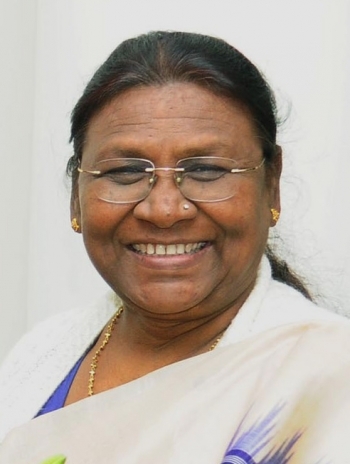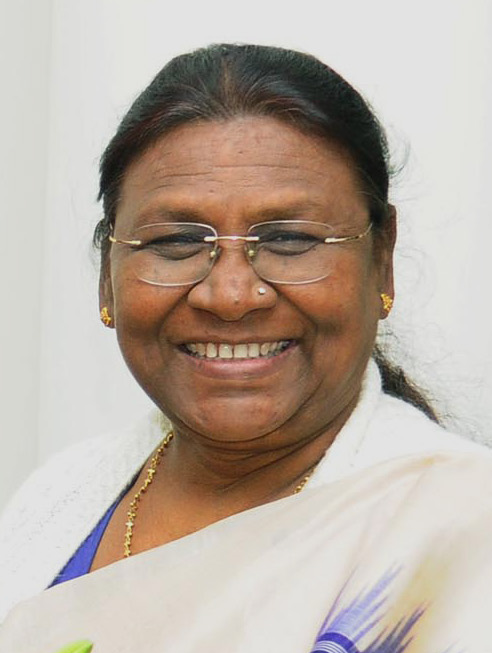
.png) Jacob Peenikaparambil
Jacob Peenikaparambil

Election of Draupadi Murmu as the next President of India is a foregone conclusion as the BJD (Biju Janata Dal), the YSR Congress and the Bahujan Samaj Party (BSP) have declared their support to her. It is a masterstroke on the part of the BJP to propose her name, as she is a tribal woman and it fits into the scheme of the BJP wooing the Dalits, tribals and the backward castes without making any substantial effort to change the socio-economic structure that keeps these communities at the bottom of the socio-economic and educational pyramid.
The BJP has the track record of choosing representatives of the backward communities to the topmost constitutional office in order to show to the world that the party is committed to the development of these communities. The BJP under the leadership of Atal Bihari Vajpayee made A P J Abul Kalam as the President. Narendra Modi government selected a Dalit, Ram Nath Kovind, and now it has selected a tribal woman from Odisha where the BJP has been making all efforts to strengthen itself.
The tribal communities and all Indians can feel proud that a tribal woman who has risen through ranks from a humble origin is going to occupy the highest constitutional office. At the same time, many write ups, which have appeared in the media, have highlighted that the main reason for the BJP selecting Draupadi Murmu is political, as it is a shrewd move to get the support of tribal communities in the upcoming elections to the states and the Lok Sabha election in 2024.
The identity of Murmu as a tribal would help the BJP to garner the support of the tribal communities in the non-BJP-ruled states with large sections of Scheduled Tribes like Chhattisgarh (31%), Jharkhand (27%), Odisha (23%), Rajasthan (13.4%) and Maharashtra (10.05%). It would be difficult for the MPs and MLAs of these states to not vote for an ST candidate.
The intention of the BJP is evident from a convention of tribals organized in Bhopal by Shivraj Singh Chouhan, the Chief Minister of Madhya Pradesh, to thank the Prime Minister and the top BJP leaders for the nomination of Murmu. Dressed in tribal attire, Shivarj and the state BJP president V.D. Sharma danced with the tribal artists, holding peacock feathers in their hands. At the same time, the Chouhan government has not taken any serious steps to settle about one lakh pending cases related to Forest Rights Act (FRA).
Chouhan has not left any stone unturned in winning the support of the tribal communities since he became Chief Minister after toppling the Congress government headed by Kamal Nath. In 2018 state elections, the BJP could win only 16 of 47 seats reserved for tribals, down from 31 seats in 2013.
On November 23 last year, Narendra Modi was invited to inaugurate a tribal convention in Bhopal. During this programme, the Prime Minister announced renaming of Habibganj railway station after Rani Kamlapati, a tribal queen of 18th century. The Chief Minister also announced a slew of welfare programmes for the tribal communities. All these appear to be tokenism without any substance.
The strategies adopted by many political parties, especially the BJP, towards the Dalits and tribals are meant for getting the votes of the most backward sections of the society rather than their genuine development and empowerment. Ram Nath Kovind was the President during the last five years and it did not make any change in the lives of the Dalits. The BJP could not eradicate manual scavenging by a group of Dalits, which is banned by law. Despite putting in place stringent laws and periodic intervention by the courts, the practice continues to prevail today. Thousands of Dalits are compelled to do this job, attributing it to unemployment, social pressure and the failure of the administrative bodies in implementing these laws.
According to a statement of the Union Social Justice and Empowerment Ministry on December 1, 2021, out of the 43,797 people engaged in manual scavenging 42,500 belonged to the Scheduled Castes. Untouchability and social isolation are intrinsically related to manual scavenging. The Brahminical social order assigns the most polluting tasks, such as removing human excreta, to Dalit castes.
In spite of the tokenism towards the Dalits by the political parties, crimes against Dalits increased during the last one decade. According to the data provided by the National Crime Records Bureau (NCRB), there were 33,719 cases of crimes against Dalits in 2011, and this figure rose to 50,291 in 2020. The numbers point to a sharp rise in such cases over a decade, of which nearly 74% took place under the tenure of the BJP.
Dalits and tribals are at the bottom of the socio-economic and educational pyramid of India. According to the Global Multidimensional Poverty Index (MPI) 2018, 50% of tribals, 33% of Dalits and 33% of Muslims are poor whereas poverty among the upper castes is only 15%. MPI is jointly prepared by the United Nations Development Programme (UNDP) and the Oxford Poverty and Human Development Initiative (OPHI).
A two-year study jointly undertaken by the Savitri Bai Phule University, Jawaharlal Nehru University (JNU) and the Indian Institute of Dalit Studies has brought to light the disparities in the wealth of people belonging to different castes. As per the study, 22.3 per cent of the country’s higher caste Hindus own 41 per cent of the country’s total wealth and form the richest group, whereas 7.8% of Hindu Scheduled Tribes own only 3.7% of the wealth.
The results of the Socio Economic and Caste Census 2011 have revealed the economic status of Dalits and tribals in relation to the non-SC/STs. 79% of rural Adivasi households and 73% of Dalits are considered “deprived” whereas the percentage of non-SC/ST deprived households is only 55%. Almost half of the Adivasi households and two-thirds of Dalit households depend on manual casual labour as the main source of income.
Tribals are the most backward among all communities in India when one applies various indicators of development like education, income, health etc, and Draupadi Murmu belongs to a tribal community in Odisha. It was reported that the work to electrify the native village of Murmu started only after 25th June since she submitted her nomination for the Presidential contest. As per a report in The Economic Times, the fact that the people in Murmu's village remained in darkness due to lack of electricity came light when journalists reached her native place after she was nominated the Presidential candidate.
Land alienation, loss of access and control over forests, enforced displacement due to development projects and lack of proper rehabilitation, and indebtedness have been some of the key reasons for the backwardness of the Adivasis in India. An anthropologist has summarized the problems of the Adivasis in three terms: “Exploitation, Expropriation and Extermination”.
Exploitation of the tribal communities by the agencies of the government and the non-state actors continues. As per the National Crime Records Bureau (NCRB), the reported crimes against tribal communities increased from 4,753 in 2018 to 5300 in 2019 and 6,899 in 2020. This may be only a fraction of the crimes committed on them. Due to lack of education and awareness many tribals may not be making any complaints to the police. In May 2022, two tribals were lynched in the Seoni district of Madhya Pradesh on suspicion of cow slaughter. It was reported that those who were arrested in this case belonged to Bajrang Dal, an affiliate of RSS.
The life of Adivasis is intertwined with jal, jungle and jameen (water, forest and land), as they form not only the basis of their livelihood but also their very existence and culture. Continued large-scale deforestation has resulted not only in the depletion of forest produce but also drying of many streams and rivulets and soil erosion. Agriculture, the main source of their livelihood, is becoming less productive. Thus the tribals are deprived of their resources. It is nothing but expropriation of their livelihood.
Ever since independence, the most crucial problem facing the tribals is forced displacement for various kinds of so-called development projects like mega dams, mines, roads, wild sanctuaries, firing ranges etc. When millions of tribals are thrown out of their natural habitat, they land up in the towns and cities as casual labourers. They not only lose the means of their livelihood but also their social and cultural life. It is a kind of extermination. According to an article published by Richard Mahapatra in the ‘Down to Earth’ magazine on 27 November 2018, more than 50% of India’s tribal population has moved out of traditional habitat.
If the BJP government is sincere in its approach to tribal communities, it has to implement the suggestions given in the report of the Xaxa Committee that was appointed in 2013. Some of the prominent suggestions related to land alienation are as follows.
Without making serious efforts to improve the holistic development of the tribal communities, especially measures to prevent land alienation and implement the provisions of FRA, election of a tribal woman as the President of India will only remain a mere tokenism. The idea of building a society based on ‘Manusmriti’ will not go hand-in-hand with the empowerment of Tribals and Dalits.